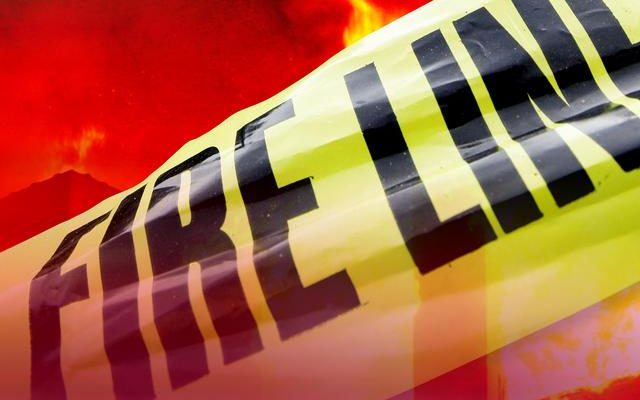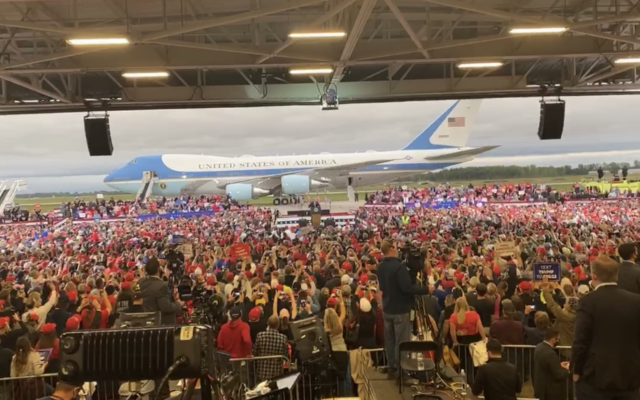Transcript: Carol Leonnig and Philip Rucker on “Face the Nation,” July 25, 2021

The following is a transcript of an interview with Carol Leonnig and Philip Rucker, authors of “I Alone Can Fix It,” that aired on Sunday, July 25, 2021, on “Face the Nation.”
JOHN DICKERSON: We turn now to a new book that chronicles Donald Trump’s tumultuous final year in office, Carol Leonnig and Phil Rucker are the authors of ‘I Alone Can Fix It.’ Good morning to both of you. Carol, let’s start with you. Your first book ended after the first impeachment. The second book has another impeachment. Is there a through line for President Trump’s administration between those two impeachments?
CAROL LEONNIG: Absolutely there is, JOHN. What’s striking about that time frame is the president learns as a result of the first impeachment that he’s untouchable. There’s no consequence for his behavior. There’s no consequence for stretching the law, bending it, breaking it, you know, in a criminal situation if he weren’t president there are a lot of people who would argue he violated the law the first time around and as well the second time around. So as he becomes more emboldened, he rejects the advice of experts, he’s the expert now. He rejects the- the suggestions of his closest advisers if it’s not what he wants because he knows best in his mind, unfortunately, in 2020, it’s no longer a PR spin game. You know, it is actually a crisis that puts all of us at risk and American lives are lost as a result.
JOHN DICKERSON: So he learned exactly the wrong lesson before the pandemic.
LEONNIG: Absolutely.
JOHN DICKERSON: Phil, you- you both covered this in the daily minutia of and it’s zaniness. Was there anything that you saw as you went over this and looked at it from a slightly higher perspective that comes when you have to sit and write a book?
PHILLIP RUCKER: You know, JOHN, when we were covering this day in and day out for The Washington Post in real time, we thought we knew it all. We thought we were in the room with our reporting. But it wasn’t until Trump left office and Carol and I did this deeper excavation and sat down with 140 cabinet members and senior administration officials and advisers to get the full story that we learned, how much worse it really was, how much- how close the country came to the brink, not only of chaos, but of democracy falling, The fears that General Milley, the chairman of the Joint Chiefs of Staff, had, that Trump could actually use the military in those final weeks as president to execute a coup, to stay in power despite the popular will of the voters to elect Joe Biden. It was a harrowing year and an especially harrowing final few months,
JOHN DICKERSON: Carol, when- when the president, after surviving the first impeachment, had this new armor, this new sense of nothing can touch me. How did that affect the people around him? I mean, did they- were they- were they unable to do anything or did they say, yes, I’m getting behind that armor and we’re going to go do great things?
LEONNIG: I sort of see the presidency in two halves as a result of the reporting that Phil and I did. That first half, there are a lot of adults. There are guardrails that are holding the president back from some of his worst impulses and they are not always successful, but largely successful. After that however, and sadly in 2020, when real crisis hits, most of those guardrails have been ground through. And a lot of the people around the president know that they’re not going to succeed unless they say yes or unless they nod politely. There’s another thing Phil and I learned that is sort of made our jaws drop, which is that we didn’t know this in real time, or we would have told the American people, many people who were the most ardent supporters of the president were afraid to counter him because they were afraid who would replace them. Would it be worse? Would there be no bulwark at all against orders to vaccinate people before the vaccine was ready? Would there be a loyalist installed to the Defense Department who would do what President Trump wanted All of 2020, which was to sick US active duty military on civil rights protesters during the Black Lives Matter summer.
JOHN DICKERSON: That was- Phil, when you interviewed the president afterwards, he said that was his greatest regret, that he didn’t, well, what- what did he say about the Black Lives Matter protest?
RUCKER: JOHN, it- it actually he said it was his only regret from the year 2020. He has no regrets, according to what he told Carol and me about how he handled the pandemic, about the hundreds of thousands of lives lost on his watch. His one regret was that he didn’t send active duty US military troops into Portland and to Seattle and to Minneapolis and to Washington to go after the Black Lives Matter protesters. These were people demonstrating injustice in the law enforcement system here in this country. And Trump wanted a show of force. He wanted to send the military into the streets to silence them.
JOHN DICKERSON: Carol, when you look back in an administration and talk to aides, you get kind of two sorts. They’re the ones who say, oh, my gosh, it was worse than you thought. And then the other kind who are still loyal. I get emails from somebody in the Nixon administration who was still- it’s like it’s 1972. What was the general temperature of the people you talked to who had served in the Trump administration?
LEONNIG: Almost to a person, even those who were so, so loyal had left with such disappointment and sadness about what happened, the death that could have been avoided. I’ll give you an example without naming sources. And again, as you know, we interviewed more than 140 people who were on the front row to this- this- this rollicking ride. But we learned in our reporting that former CDC director Robert Redfield, his biggest disappointment that he confided to aides was that he could not convince Donald Trump to wear a mask. And he knew that not only would it protect the president, it would send a message to the country. And he believes that American lives, thousands of them, could have been saved if he had been successful. He tried convincing the president’s physician, Sean Conley, you know, please reach out to him, get him to do this. The president resisted. He thought it made him look weak. And Conley, the doctor, said to Redfield, ‘I’m so sorry. You know what it’s like when you don’t have- when you have a patient that doesn’t listen to you.’
JOHN DICKERSON: So what was the governing principle of, what was the principle that drove Donald Trump?
RUCKER: It’s really simple. The principle was, how do I better myself and how do I better my political fortunes? That’s what Trump talked about and thought about every minute of every day in making decisions throughout the four years of the presidency, but especially in his final year as a crisis hit the American people, the pandemic, the economic crisis, the racial justice crisis. He thought every single moment of that time, how do I look better for November 3rd for the election? And he set aside the other concerns. And that’s what was really troubling to the people who served him and confided this in us.
JOHN DICKERSON: It- help me figure out this puzzle, Carol, which is if that’s the mindset, why isn’t the president talking about vaccines more? He could say Operation Warp Speed, this is a huge success. Get vaccinated. Why- why has he responded, do you think, the way he has?
LEONNIG: In terms of good governing, sadly, this fits the pattern for Donald Trump. You know, none of his answers are exactly consistent. For example, everyone who served him told us, well, I should say everyone we interviewed on this subject told us it would have been so easy for him to protect American public health if he had just listened to his doctors, if he had just said, according to his medical experts- experts wear the mask. The vaccine works. If he had just continually said that. But not- but- but what he was focused on was the daily, hourly, weekly news cycle. I’m going to win the optics war. This was the Trump toolkit that was so inadequate for a real crisis. And what Phil and I were warned about by sources when we wrote the first book, this guy’s tool kit is going to be inadequate if–
JOHN DICKERSON: We go to wrap. Sorry Carol.
LEONNIG: Oh, I’m so sorry.
JOHN DICKERSON: No, we’ve run out of time. Carol, Phil, thank you so much.
RUCKER: Thank you.
JOHN DICKERSON: And we’ll be right back.



